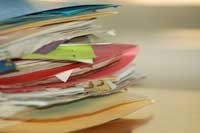Tax time is a good time to clean the filing cabinet and eliminate yourself of old paperwork. Yet, the fear of throwing out financial papers causes many people to save everything, leaving a packed filing cabinet with yellowing paperwork.
While saving old tax claims is not only wise but a necessity, how often are these forms really reviewed? For most people the hopeful answer is never. The moment the taxes are in the mail place all receipts and copies of the tax forms in a large envelope, label it "2005 taxes", and seal it. Should an audit or other evaluation require the forms to be produced, they will be neatly together in the filing cabinet without any worry. Each year remove the oldest year and shred the entire envelope.
How long should a person keep the forms? While there is no concrete answer, many CPAs suggest that seven years is more than enough. For most people who file accurate tax returns without any special circumstances, the statue of limitations expires three years after the date of filing.
No, some things do not need to be saved. Items like old checks, monthly bank statements, credit card bills, and utility bills are catalogued by the company issuing the bill/statement. Should the need arise, they can pull up the account history easily. Shred utility bills the moment the payment is posted to the account. Credit card statements fall into the same category unless there is a tax deduction on them.
Other items absolutely need to be saved. Receipts for major purchases such as household improvements or jewelry need to be kept for insurance or resale. All warranties and receipts for the items under warranty should be saved as long as one has the items. Mortgage statements, vehicle pink slips, and contracts should be kept indefinitely.
Most paperwork is kept for tax purposes. Pay stubs need only to be kept for the tax year. Once the amounts are checked with the W-2 form issued for that year, all pay stubs for the year can be shredded. In other words, only keep the current year for which you have not yet filed taxes.
Other items which can usually be thrown away but might be kept for taxes are credit card statements. Often these list items purchased rather than amounts spent like store receipts. This helps to prove that a person spent $145 at Staples for business supplies rather than on an iPod.
The final note about cleaning out the filing cabinet falls into the heading of safety. No, not safety from an IRS audit or a late charge on the light bill - safety from identify theft. Always shred discarded documents. A stolen identify is far worse than a missing tax form from 1988.

About The Author: Kelly Ann Butterbaugh is a freelance writer who regularly contributes to a variety of magazines as well as online newsletters. She teaches writing in the public school as well as at the collegiate level. Contact her at Englishteach@rcn.com or visit her website at users.rcn.com/
Add your voice! Click below to comment. ThriftyFun is powered by your wisdom!